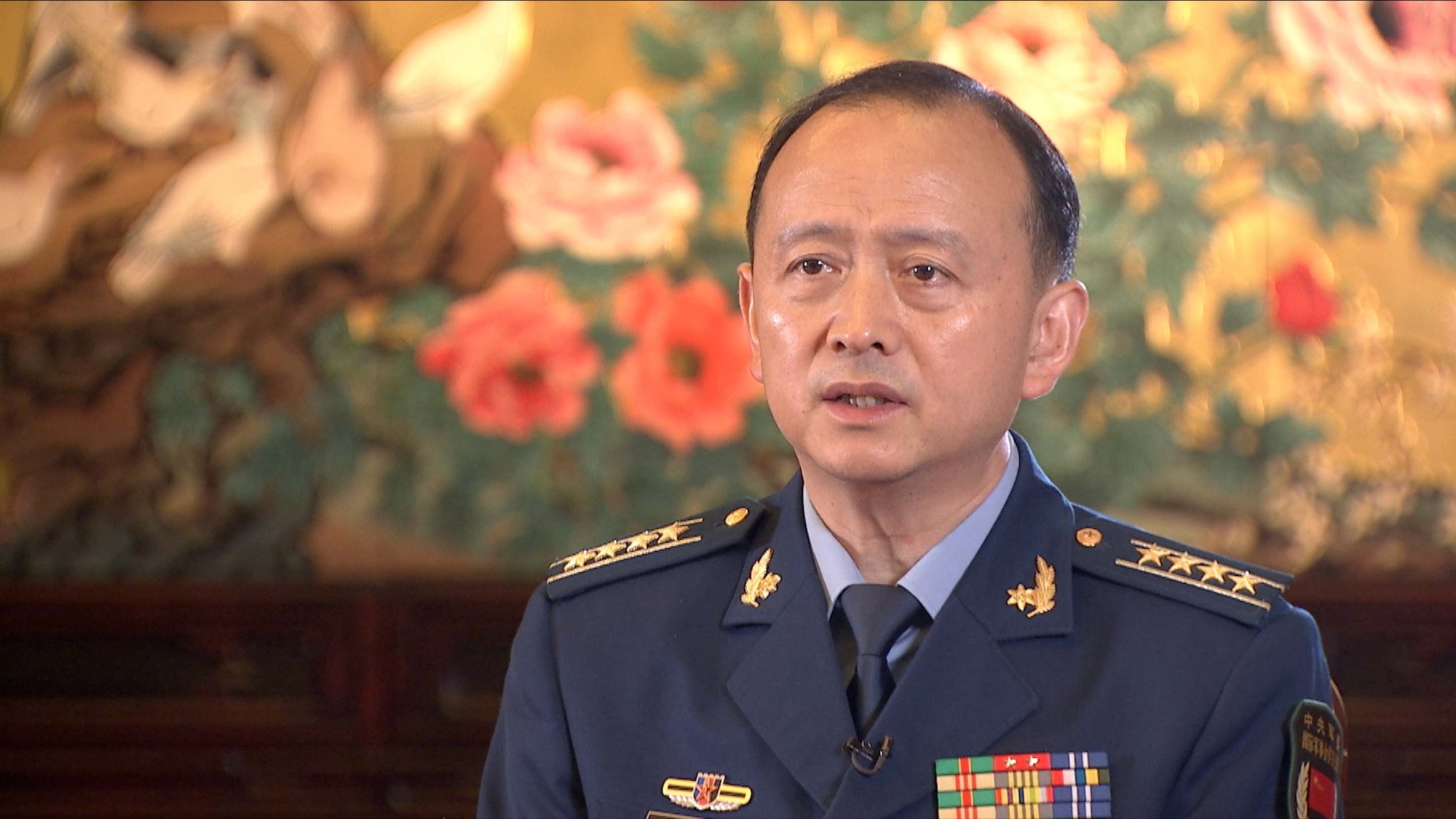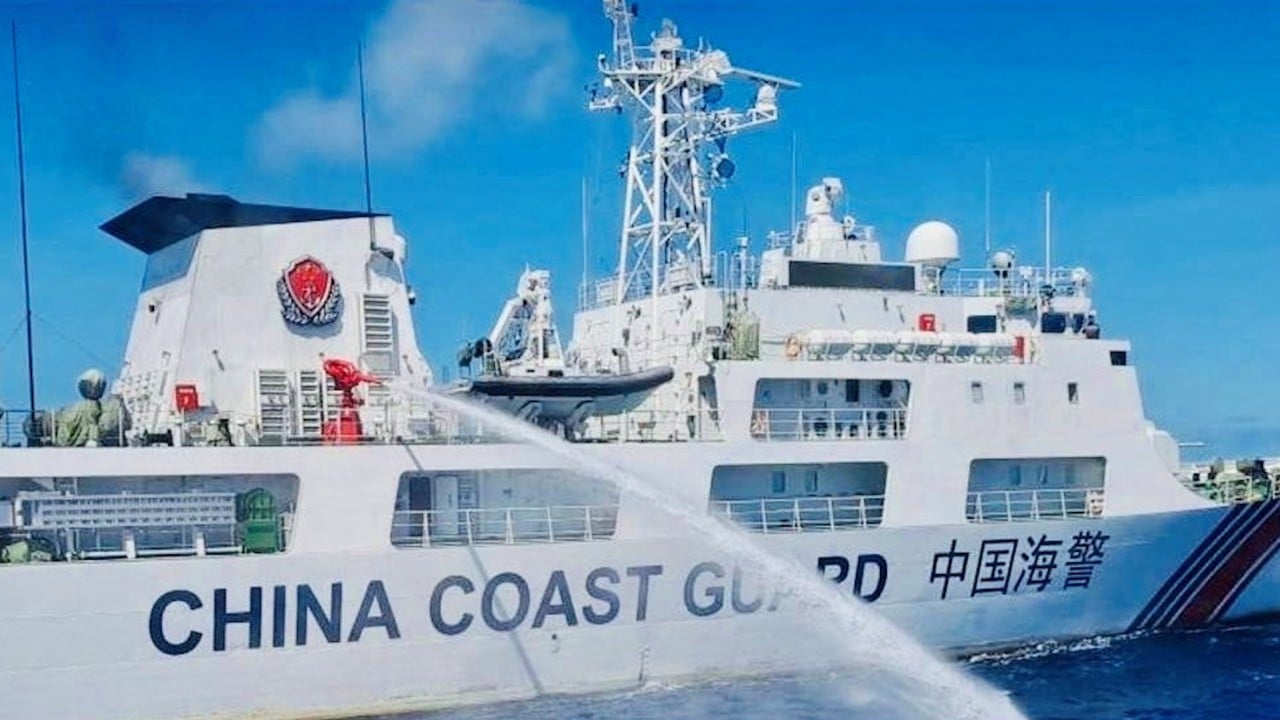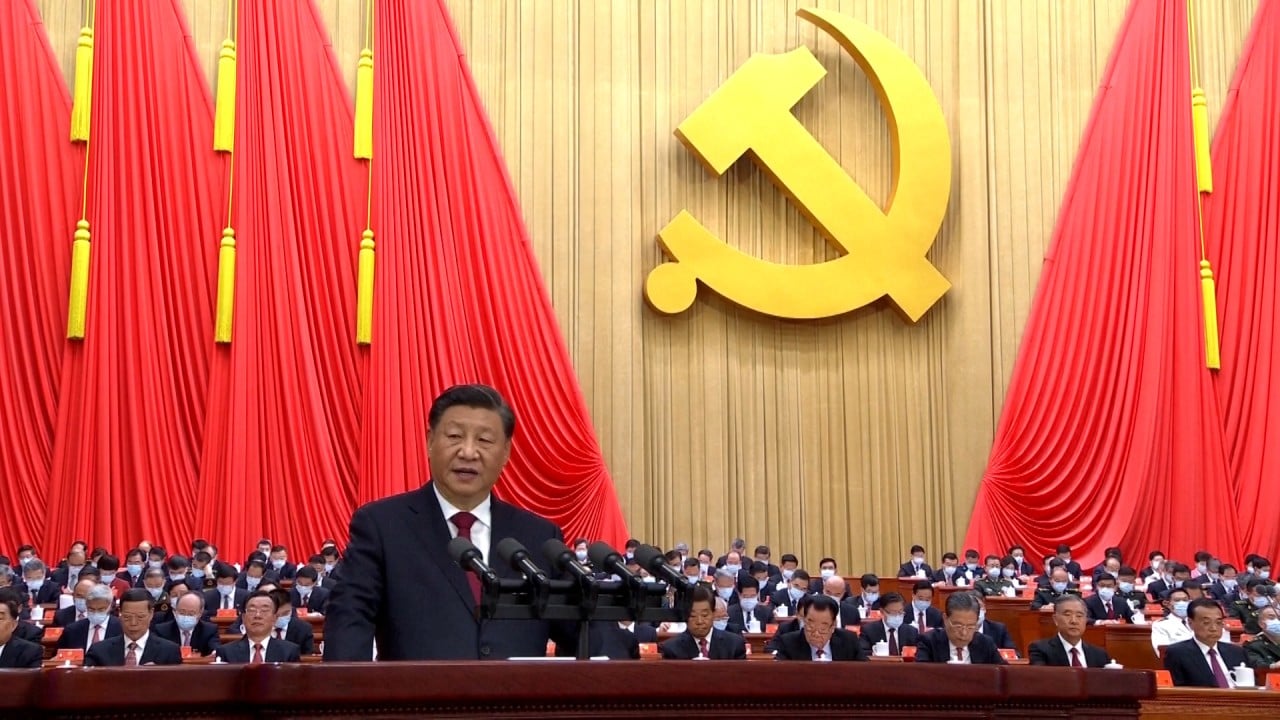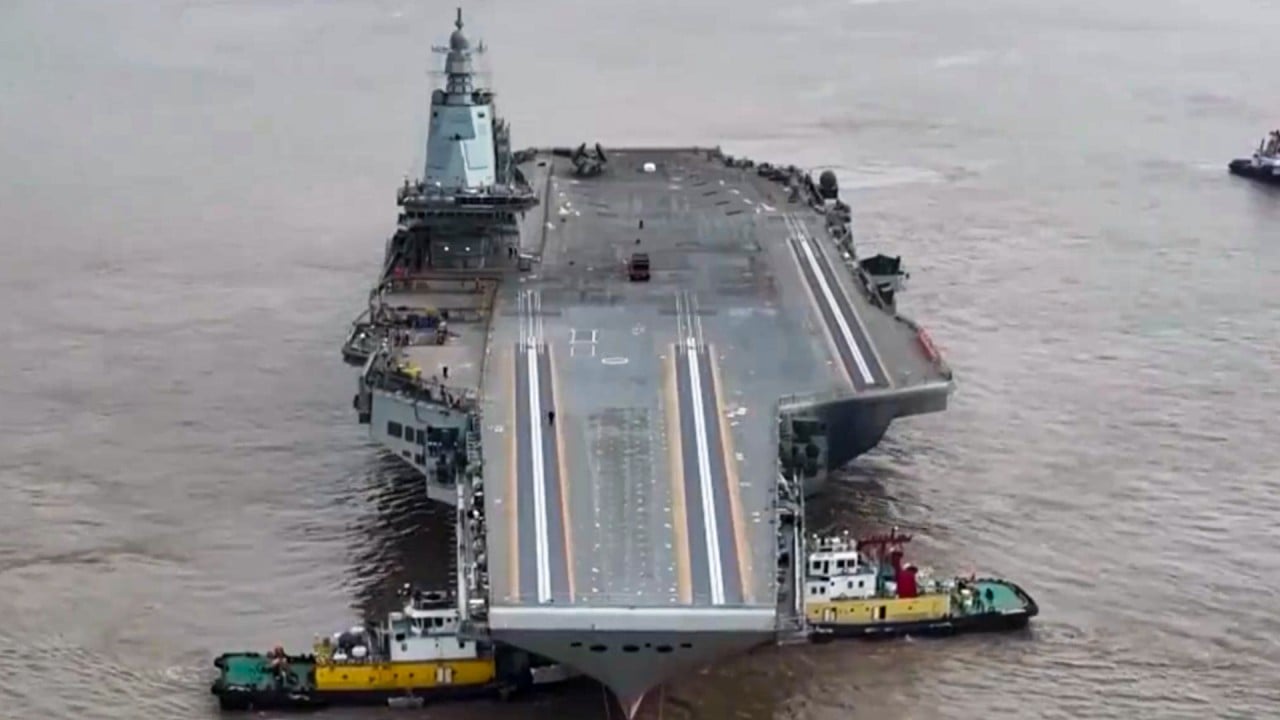
Open questions | China used water cannons as ‘deterrence’ against Philippine ships, PLA senior colonel Zhou Bo says
- Zhou Bo shares his insights on global and regional challenges, based on long experience in military diplomacy
- Wide-ranging interview covers tensions in the Taiwan Strait and South China Sea, conflicts in Ukraine and Gaza, and the PLA’s modernisation
China and the Philippines have been in a row for some time over disputed islands in the South China Sea. Do you see the situation continuing and what is China’s strategy?
But it was the Philippines that first resorted to the threat of force. In April 2012, they sent a naval vessel to detain and arrest Chinese fishing boats and fishermen in the waters of Scarborough Shoal.
China has been forced to take necessary measures in response to such provocative conduct. However, our response is restraint.
For humanitarian reasons, we haven’t stopped the Philippines from providing water and food to their soldiers on board the grounded ship. Otherwise how could they have stayed there for the past 25 years?
Well, the best-case scenario would be for the Philippines to tow the ship away as they have pledged. At least they shouldn’t try to reinforce the ship. The best way is to let Mother Nature solve the problem with her force majeure.
US-led alliance adds to Beijing’s challenges in East and South China Seas
In the worst-case scenario, if they continue to be this provocative, we will definitely see more tension. It is the Philippines that violated its own promise in 1999. China’s demand is entirely reasonable and we have demonstrated immense patience over the past decades.
Will Asean form a Nato-like alliance? This is impossible. Asean itself is not a military alliance by nature. It has claimed its centrality and its centrality has to rely on impartiality. That China has disputes with the Philippines doesn’t mean it has issues with the entirety of Asean, regardless of the Philippines being a member.
The South China Sea issue cannot be interpreted as China having disputes with Asean. China only has disputes with a few Asean claimants. Actually, many of its member states have overlapping claims in disputed waters among themselves.

What do you make of the role of the United States in the South China Sea tensions?
I don’t believe the US would necessarily come to the fore to confront China on behalf of any Asean claimants. They wouldn’t be so stupid. They already have enough trouble in Europe and the Middle East.
China has never threatened to use force against Asean countries. China has also honoured its commitments to the 2002 Declaration on the Conduct of Parties in the South China Sea, which discourages the use of force in the region.
I hope the Philippines would not be stupid to become more adventurous. They should know they don’t stand a chance vis-à-vis China. The strength of the Chinese side is way beyond that of the Philippines. Even if this situation may continue for a while, eventually the Philippine government will have to back down.
South China Sea: Beijing must ‘step up pressure’ on Manila or risk domino effect
Commenters in the West describe PLA activities in the South China Sea as “dangerous manoeuvres” or “reckless behaviour”. What role do you think a dominant narrative or understanding plays in modern geopolitics?
I think that portraying the PLA as coercive or reckless is a kind of deliberate Western narrative. But so far, the Western media has not described the PLA in a more negative way because they just can’t find examples.
Without a single war being fought over the past four decades, we reached the second position in the world. Isn’t that phenomenal? This is not just luck. We have endured and held back for our goals and for a bigger picture. I sincerely believe China’s rise is peaceful – and rare in human history.
The PLA certainly generates a lot of different reactions in different people – awe, fear or uncertainty. The PLA Navy is now the largest navy in the world. So it is natural for people to ask what an ever stronger PLA means for China and the world. But some argue that the PLA has not fought a war since 1979 and doubt whether the PLA can fight.
For all the militaries in the world, there is a common task: to defend territory and sovereignty. But since China is a major global power, its military has two more duties: to safeguard its overseas interests and shoulder its international responsibilities.
For example, the PLA has offered equal protection to Chinese and foreign vessels in the Gulf of Aden since 2009. This is a good example of how a strong PLA can best blend China’s national interests with its international responsibilities.
China has set a goal to turn its vast military into a modern fighting force by 2027, the centenary of the PLA’s establishment. What does this goal specifically mean? What kind of force does the PLA want to become?
The 2027 goal is a different story, since it marks the 100th year since the PLA’s establishment, a landmark moment. We want to build up our military and be ready to advance to our 2049 goal.
At the same time, we are facing our biggest dilemma, that is, how to prove we are a world-class military without fighting and winning some difficult battles. China has reaped tremendous benefits from maintaining peace with other countries so it clearly cannot test whether the sword is sharp by chopping heads – that is the wrong thing to do.
While we haven’t been at war for 40 years and more, that does not mean that we cannot fight, otherwise the American military would not need to be so worried about the PLA.
Why does China want to speed up the progress on building its military?
I think that has a lot to do with how you see the overall situation, meaning tensions in US-China ties or potential conflicts in the Taiwan Strait and the South China Sea. Taiwan should be the most important factor.
The US is intensifying competition with China and is providing support to Taiwan, despite saying it follows the one-China policy. Those are good reasons we should speed up achieving the PLA’s goal.
China’s Fujian aircraft carrier set for maiden sea trials
Some US officials have said China aims to build up its military capacity to be ready to take Taiwan by 2027. Do you think the PLA timeline has anything to do with Beijing’s goal of unifying Taiwan?
If you study carefully what China has said, it is still about peaceful reunification. We mentioned at the Communist Party’s 20th national congress [in 2022] that we would have ultimate patience and make utmost efforts for a peaceful reunification. Right now, I think this very much remains the same.
Do you think Taiwanese president-elect William Lai Ching-te may step across Beijing’s “red lines”? Beijing has already labelled him a troublemaker, as well as a “stubborn Taiwan independence activist”.
Honestly, I don’t know. I think there is some good reason for us to say he is a “stubborn Taiwan independence activist” because he once declared himself as a “pragmatic worker for Taiwan’s independence”. But the point is, when a man gets a new position, things may change. So we’ll have to wait and see what he’s going to do. I believe the US is also watching closely.
Beijing’s spy chief vows to fight ‘Taiwan independence’ as inauguration nears
Historically speaking, we didn’t fly across the median line, at least not as often as we are doing now. Things changed after the Pelosi business. Her trip to Taiwan was totally unacceptable to us. This kind of provocation resets the status quo.
If she hadn’t visited Taiwan, it would have been hard for us to conduct the live-fire exercise around the island which lasted for four days. Such provocations will definitely lead to reactions which in turn, will create irreversible new status quos. You see now we fly much more often across the median line – that’s a response to their provocation. That is also a new status quo.
According to many officials and think tanks in the US, the most likely military option against Taiwan is a blockade, which they regard as likely to fail. What do you think?
Military planners seldom rely on one option. I think we have different options. Our choices depend on what actually happens.
Moving away from Taiwan, what are your thoughts on the Ukraine war?
No war will last forever, the question is how and when it will end. I don’t believe the Ukrainians will be able to take back their lost territories. They will be lucky if Russia does not advance beyond the regions already taken, because Ukraine’s counteroffensive – which is fully supported by the West – has failed since it was launched last year.
The military balance is not in favour of the Ukrainians and the whole of the West doesn’t have enough ammunition to offer in an endless and seamless way. I don’t believe Ukraine will have the upper hand, especially if Donald Trump comes back.
He may just make a U-turn on the US’ Ukraine stance. That is the worst fear of European countries. We just don’t know when it will end since both sides don’t have the wish for a ceasefire now.
So what are your thoughts on China’s position on the war in Ukraine?
This war matters a lot for China and even reflects China’s ever-rising international position as, all of a sudden, everyone asks which side are you on and what is your thinking.
This is interesting because the war has nothing to do with China. Why would people ask about China? Because China’s approach is too important to ignore.
The West believes China can simply tell Russia to end the war. But how can things be that simple? It is really sad to see how a war that has nothing to do with China has actually soured ties between China and the European Union.
But I am not pessimistic. I think that as long as the Ukraine war continues, the relationship can’t be too good, because the EU has high expectations of China that Beijing cannot meet. But as long as there is no war in the Taiwan Strait, China-EU ties won’t be too bad because they don’t have to make a hard decision between the United States and their largest trading partner.
‘Turtle tanks’: Russians unveil effective innovation on Ukraine battlefield
What’s your take on the war in Gaza?
No one knows when the Ukraine war will come to an end. But in the Middle East, even if a war comes to an end, nobody knows when it will crop up again.
The war in the Gaza Strip has brought too many casualties, to the extent that it has been described as genocide. US support for Israel has delivered a heavy blow to its moral authority and really hurts its image and credibility, especially in the Global South. The impact will be long lasting.
Going back to Ukraine, we believe the Chinese leadership has been watching the development of the war closely, so what lessons would they be taking? Also, how do you regard Russia’s resilience? Could it hold on, despite the massive costs of the war?
Russia’s economy actually is doing quite well, with economic growth of 3.6 per cent last year. This has surprised everybody – probably even the Russians themselves – while Ukraine’s economy is in bad shape.
On lessons learned, apparently Russia is making progress on the battlefield. But in the beginning, they didn’t seem so prepared – no forward command, no adequate logistics supply, no drones, no encrypted communication and no precision-guided bombs. But that has changed.
Another lesson is that the pattern of war has changed a lot and the PLA must keep pace with advanced technologies, including drones and maybe artificial intelligence one day, while maintaining traditional things like tanks and artillery.
In the past, we might have considered drones to be supplementary, but it has proven to be a new combat platform that could bring massive changes to the battlefield. We saw this in both Ukraine and the Red Sea.
Meanwhile, we cannot totally rely on new technologies because you see that tanks and artillery are still being used and people are still digging trenches in the Ukraine war – like during the first world war.
Speaking of advanced technology, how is China applying AI in the military and could China cooperate with the US in this area?
On the first question, we have state of the art drones of all sorts. I don’t think we have yet seen the application of AI directly in military warfare. I think even the US hasn’t demonstrated that.
President Xi Jinping and US President Joe Biden agreed in San Francisco last year to set up China-US government talks on AI, but it was not specified whether the dialogue would involve the militaries.
But I assume it is not entirely impossible in the long term because both countries understand the importance of ensuring human control of weapons systems. Advanced AI has made this issue more acute.
Killer robot arms race: AI faces its ‘Oppenheimer moment’
Would there be some areas that the US and China could prioritise to prevent some dangerous applications of AI, such as in nuclear weapons?
I think it would be difficult in the near future for China and the US to talk about that because these are highly sensitive areas. So far, there are no official consultations or negotiations in the nuclear field between China and the US. For this to happen, either China needs to drastically increase its nuclear arsenal or the US massively reduces its nuclear arsenal. Neither is possible.
But I think both China and the US need to make an effort to make sure that this kind of advanced AI would not be applied in the most crucial military areas, including nuclear weapons. Nothing is more important than making sure of absolute human control of the nuclear command and control system.
Last year, China and the US resumed military dialogue. Now that they are talking again, what should we expect?
This is a new mechanism that has to be thoroughly explored by the two sides. For example, is the conversation just between commanders of the PLA Southern Theatre Command and US Indo-Pacific Command, or could it also involve the PLA Northern Theatre Command and Eastern Theatre Command?
This is because American reconnaissance and surveillance along the Chinese coast cover areas of all these three Chinese military commands. Would the commanders talk regularly or just during a crisis? I assume they basically talk about dangerous encounters between ships and aircraft. But what about a dangerous situation that involves a third party? Questions like this could go on and on.
China’s chip executives call for global cooperation despite US curbs
What is the risk of an encounter between the Chinese and US ships and aircraft?
There have already been a number of dangerous close encounters between US and Chinese aircraft. According to the Pentagon, in the two years from the autumn of 2021, the PLA intercepted more than 180 American aircraft. We have to make those interceptions because you can’t just come so close to us to make provocations.
I do not see an easy solution to this because it is difficult for the US to back down. They have been doing this for a long time and if they stop, they would worry about their image in the eyes of their allies. But I don’t understand why the US has to scrutinise China at such a high frequency. Don’t they have a lot of drones and military satellites that provide real-time intelligence?
Is the risk of US and China military encounters overestimated? How dangerous are they, and is there a way out of the situation?
They’re certainly very dangerous, when aircraft and ships get so close. Chinese and Americans have different takes on safety and security, which are the same word in Chinese. Americans talk about safety. We talk about security.
Safety refers to keeping your property, like your ships, and personnel safe but security connotes more meaning. It’s about sovereignty, rights and interests. International maritime law doesn’t necessarily help.
In 2013, I headed a Chinese delegation to the Pentagon to discuss the legal implications of freedom of navigation. Each side had different interpretations of international maritime law. So there are no easy solutions to mitigate the risk of encounters.
How many aircraft carriers does China need and why is it important for China to have them?
I cannot speculate on how many carriers China will need. But I can tell you that aircraft carriers are primarily not for coastal fights. They are for a possible war far from home.
People may say that one day, when China has to retreat from peaceful means to resolve the Taiwan issue, we could use aircraft carriers. Of course they are useful, but they are more useful in our power projection in the Pacific Ocean, Indian Ocean, or Atlantic Ocean – anywhere far from our waters – because they are platforms for the ships and aircraft that make us powerful.
The US has said China will have 1,000 nuclear warheads by 2030. What do you think are some of the Chinese leadership’s considerations behind the advancement of its nuclear capabilities?
Nobody in China will tell you how many nuclear warheads we have because that is considered a secret. Having said that, it is not a secret that we want to have a nuclear arsenal that is effective and modernised.
Everybody worries about the use of nuclear weapons in the Ukraine war. Then why don’t we discuss no first use of nuclear weapons? The Biden administration has talked about the use of nuclear weapons only in extreme circumstances, which means it is actually not so far away from China’s no-first-use policy.
China to exceed predictions with over 1,000 nukes by 2030: Pentagon report
China’s no-first-use policy has remained the same for decades. I think we should discuss no first use of nuclear weapons between China and the US, France and Britain. China and Russia have agreed on no first use.
As a goodwill gesture and to mitigate the worst fear of the West that Russia might use nuclear weapons in the battlefield, perhaps Nato can unilaterally announce not to use nuclear weapons against Russia first.
Nato can afford to do this because its conventional forces are much stronger than Russia’s and such a commitment won’t reduce its nuclear retaliation capacity.












